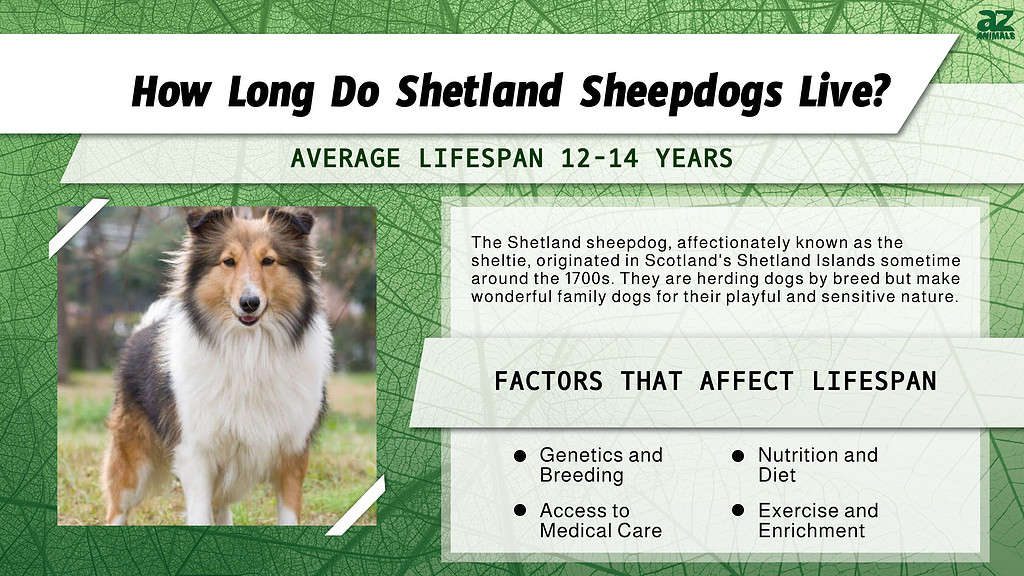The Shetland sheepdog, affectionately known as the sheltie, originated in Scotland’s Shetland Islands sometime around the 1700s. They are herding dogs by breed but make wonderful family dogs for their playful and sensitive nature.
These dogs have long, thick, straight-haired coats and are moderately sized, resembling miniature collies in appearance. In adulthood, they tend to measure between 13 and 16 inches at the shoulders and weigh around 25 pounds when healthy. In general, shelties are very intelligent dogs and tend to excel at interpreting the cues of their caretakers. Many shelties thoroughly enjoy the physical and mental stimulation that accompanies agility games and herding activities. Shelties are not hypoallergenic, however, so those with sensitivities to animal fur and dander should consider a different breed.
If you’re considering adopting a sheltie, you’ll be happy to know that they tend to be pretty long-lived! The sheltie’s lifespan is usually somewhere between 12 and 14 years. There are a number of factors that can affect your sheltie’s lifespan, though, as well as their quality of life. Genetic risk factors and disease, diet, weight, and the age at which they are spayed or neutered can all contribute to the health, happiness, and length of your dog’s life.

Originally bred in Scotland for herding, the Shetland sheepdog is, in general, a long-lived, affectionate, and energetic breed.
©iStock.com/yanjf
Factors That Affect Sheltie Lifespan

Below, we’ll talk about several of the diseases and disorders that shelties may face, some basic guidelines for feeding, as well as some things to consider when choosing whether and when to alter your dog.
Common Health Issues
Shelties tend, on average, to be a very healthy breed. Although there are a number of genetic diseases that occur in individuals of the breed, they are not common. Most of the ones that do occur don’t usually affect the dog’s lifespan but can certainly impact their quality of life.
If you choose to adopt a sheltie, you can have your dog screened or tested by a trusted and experienced veterinarian. Your vet will usually take x-rays to assess the health of your sheltie’s hips as well as assess the status of your dog’s eyes. There are other tests available to determine whether your dog has or will likely develop conditions such as hip dysplasia, thyroid disease, ocular disease, or epilepsy.
One condition, dermatomyositis, occurs most prominently in shelties and collies. It is an autoimmune disorder that can cause hair loss and crusting of areas on the face, ears, legs, feet, and tail. Onset of the condition may begin at any time during a sheltie’s life but can occur as early in life as 12 weeks of age. Crusts and lesions may come and go over time, and stress can exacerbate their occurrence. Treatments are available for those dogs who develop the condition.
Proper Nutrition
As with humans, proper nutrition is important for longevity and long-term health. If you adopt your sheltie as a puppy, it’s absolutely crucial for their long-term quality of life that they receive puppy food for long enough. The AKC recommends that small breed puppies should change over to an adult diet at around 9 months of age, while larger breeds should make the change at around a year.
The organization also recommends that it is better to feed puppy food for too long than for not long enough. This is because puppies’ bodies require foods that are much more nutrient dense in order to grow properly. Commercial puppy foods contain much higher percentages of protein as well as more fat to help growing puppies absorb higher quantities of vitamins and minerals.
You can help increase your sheltie’s lifespan and quality of life by helping them to maintain a healthy weight. Recent research shows that overweight dogs tend to have lifespans that are quite a bit shorter on average — by nearly 2 years! When feeding your dog, consider their activity level and nutritional needs and monitor major weight fluctuations to alert you to changes in health. Excess weight can also exacerbate joint conditions in both the short and long terms. If you need help deciding what to feed your sheltie to ensure that their dietary needs are met, consulting a canine nutritionist is a great option.

Adjusting your dog’s diet to match their energy levels is an important part of maintaining their long-term health. Large amounts of excess weight can shorten your dog’s lifespan and exacerbate joint problems in dogs who struggle with them.
©OlgaOvcharenko/Shutterstock.com
Spaying and Neutering
Altering a dog cuts its body off from hormone production that is essential for proper growth and development. Going forward with the procedure too soon can, in some breeds, diminish the dog’s long-term quality of life. The age at which you should spay or neuter your sheltie, if you choose to, can vary between sexes and individuals.
While it is not overly common, some shelties may be at increased risk of developing hip dysplasia. One study considered more than one million dogs over a period of 40 years and showed that, in general, altered males were more likely to develop hip dysplasia. Another study, with a focus group consisting of 133 shelties specifically, concluded that neutering male shelties before 6 months of age may contribute to an increased risk of joint disorders. The same study also showed a significant increase in urinary incontinence among female shelties who underwent alteration before 2 years of age. Those who wish to alter their dogs should take these factors into consideration and consult a trusted vet to work out the appropriate timing.
Ready to discover the top 10 cutest dog breeds in the entire world?
How about the fastest dogs, the largest dogs and those that are -- quite frankly -- just the kindest dogs on the planet? Each day, AZ Animals sends out lists just like this to our thousands of email subscribers. And the best part? It's FREE. Join today by entering your email below.
Thank you for reading! Have some feedback for us? Contact the AZ Animals editorial team.








